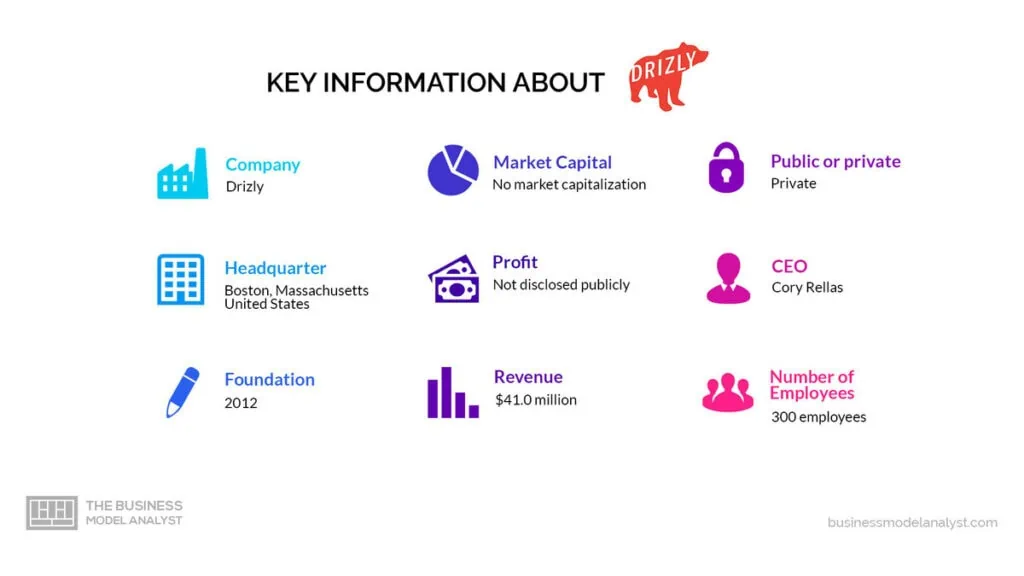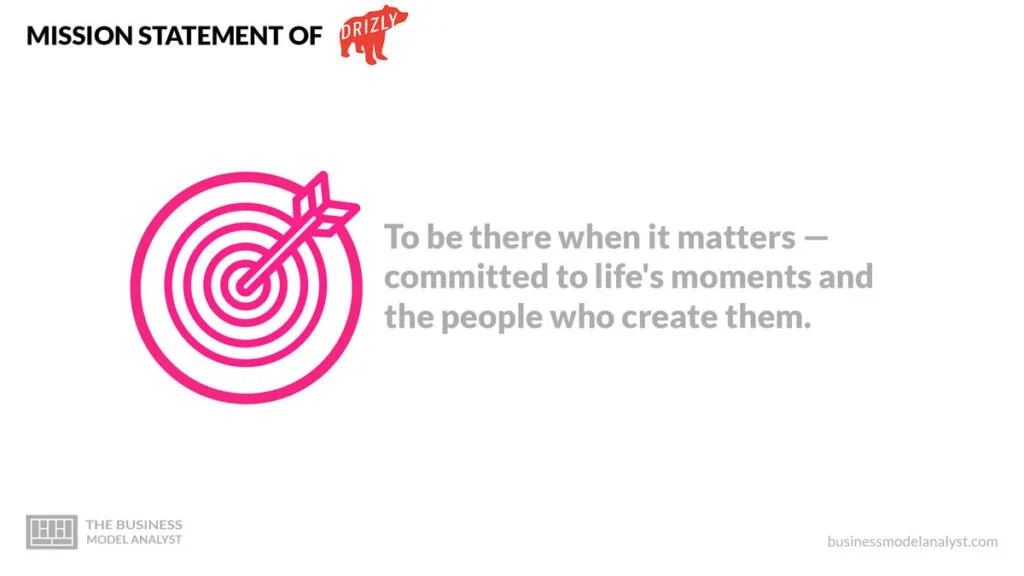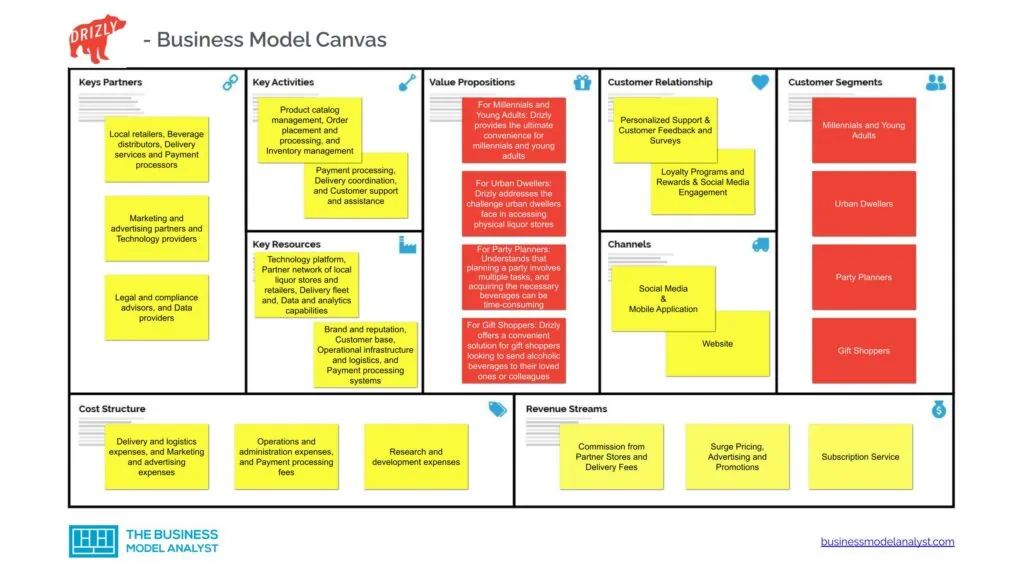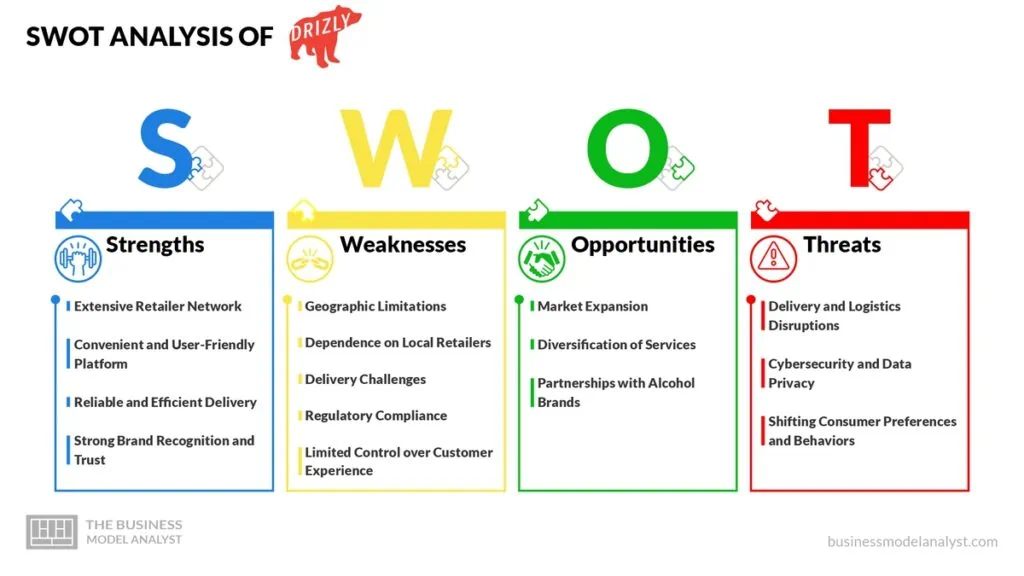Drizly Business Model is a two-sided marketplace business model. In this model, Drizly serves as an intermediary platform connecting two distinct groups: customers seeking alcohol and local liquor stores. Customers use the Drizly platform to browse and order alcoholic beverages from nearby liquor stores.
Drizly earns revenue through commissions paid by the liquor stores for orders received through the platform and delivery fees charged to customers. The platform leverages technology, logistics, and partnerships to create value for both customers and liquor stores, facilitating convenient and efficient alcohol delivery services.

Contents
A brief history of Drizly
Drizly was founded in 2012 by Nick Rellas, Justin Robinson, and Spencer Frazier in Boston, Massachusetts. The founders saw an opportunity to leverage technology to offer convenient alcohol delivery services. After securing seed funding in 2013, Drizly expanded its operations beyond Boston and launched in several major cities across the United States, including New York, Chicago, and Los Angeles.
In 2015, Drizly raised $13 million in Series A funding, allowing further expansion and improvements to its technology platform. Over the years, Drizly formed strategic partnerships with notable alcohol retailers and brands, enhancing its offerings and driving growth.
These partnerships helped solidify Drizly’s position as a leading player in the alcohol delivery market. In 2020, Drizly expanded internationally by entering the Canadian market, bringing its services to cities such as Calgary, Edmonton, and Vancouver.
In February 2021, it was announced that Uber would acquire Drizly for approximately $1.1 billion. Drizly became a wholly owned subsidiary of Uber on October 13, 2021, after Uber completed the acquisition of the company.
The acquisition allowed Drizly to gain access to Uber’s vast resources, technology, and delivery infrastructure. This could potentially accelerate Drizly’s expansion plans and enable it to reach new markets more quickly.
Despite the acquisition, Drizly continued to operate as a standalone brand within the Uber portfolio. This allowed Drizly to maintain its brand identity and leverage its existing customer base and relationships with liquor store partners.
Who Owns Drizly
Drizly was initially owned by its founders, Nick Rellas, Justin Robinson, and Spencer Frazier. However, following the completion of the acquisition by Uber in October 2021, Drizly is now wholly owned by Uber. Uber is a multinational technology company that operates a ride-sharing platform connecting drivers and riders through a mobile app. The company was founded in 2009 by Travis Kalanick and Garrett Camp.
Drizly Mission Statement

Drizly’s mission statement is “to be there when it matters — committed to life’s moments and the people who create them.”
How Drizly works
Drizly works by efficiently connecting customers with local liquor stores, managing orders and deliveries, and ensuring compliance with legal regulations. Here’s a detailed step-by-step explanation of how Drizly operates its business:
Liquor Store Partnerships
Drizly establishes partnerships with local liquor stores and retailers in various cities and regions. These partnerships allow Drizly to offer a wide range of alcoholic beverages to its customers.
Inventory Management
Drizly works closely with its partner stores to maintain an up-to-date inventory database. This includes regularly updating product availability, prices, and descriptions.
Online Platform
Drizly operates through its online platform, which consists of a website and a mobile app. This platform serves as a marketplace where customers can browse and purchase alcohol products.
Location Verification
Customers are required to register an account on the Drizly platform. This typically involves providing their email address, contact information, and age verification. Upon registration, users are prompted to enter their delivery address. Drizly uses this information to determine whether its services are available in the user’s area.
Product Selection
Once users have access to the Drizly platform, they can browse through a wide selection of alcoholic beverages, including beer, wine, spirits, and mixers. The product listings provide detailed information, such as descriptions, prices, and customer reviews.
Order Placement
When users find the products they want to purchase, they can add them to their virtual shopping cart. Drizly facilitates a smooth and user-friendly checkout process, allowing customers to review their orders and make any necessary modifications.
Payment Processing
Drizly facilitates secure online payments for orders. Customers can provide their payment information during checkout using credit cards, debit cards, and sometimes even cash on delivery.
Age Verification and ID
To comply with legal regulations surrounding the sale of alcohol, Drizly implements age verification measures. During the checkout process, users are typically required to provide their date of birth and confirm that they are of legal drinking age. Also, when the delivery driver arrives at the customer’s specified address, they are required to verify the recipient’s age and identity. Customers must present a valid identification document to confirm that they are of legal drinking age.
Delivery Options
Drizly offers various delivery options based on the user’s location and the partnering liquor stores in that area. Some areas may provide on-demand delivery, where the order is delivered within an hour, while others may offer scheduled deliveries for a specific date and time.
Delivery Tracking
Throughout the delivery process, Drizly provides real-time updates to the customer. This includes notifications when the order is being prepared, when it’s out for delivery, and when it has been successfully delivered.
How Drizly makes money
Drizly makes money from the following:
Commission from Partner Stores
Drizly partners with local liquor stores and retailers to offer their products on the platform. When a customer places an order through Drizly, the company receives a commission from the partner store for facilitating the sale. This commission is typically a percentage of the total order value.
Delivery Fees
Drizly charges customers a delivery fee for each order. The fee may vary depending on factors such as location, time of day, and order size. This fee helps cover the costs of delivering the alcohol to the customer’s address, including driver compensation and operational expenses.
Surge Pricing
Similar to ride-hailing platforms like Uber, Drizly may implement surge pricing during periods of high demand. During peak times, such as holidays, weekends, or special events, the prices of products on the platform may be increased. This allows Drizly to capitalize on increased demand and generate higher revenue.
Advertising and Promotions
Drizly offers advertising and promotional opportunities to its partner stores. Liquor stores can pay Drizly to feature their products more prominently on the platform, increasing their visibility and potential sales. Drizly may also run promotional campaigns, such as discounts or exclusive offers, in collaboration with partner stores, charging them for these promotional services.
Subscription Service
Drizly introduced a subscription service called “Drizly Express” in specific markets. For a monthly or annual fee, subscribers receive benefits such as waived delivery fees, discounted prices, and exclusive promotions. The subscription revenue adds to Drizly’s overall earnings.
Drizly Business Model
Let’s take a look at the Drizly Business Model Canvas below:

Drizly Customer Segments
Drizly’s customer segments consist of:
- Millennials and Young Adults: This segment comprises individuals who belong to the millennial and young adult age groups, typically ranging from 21 to 35 years old. They are digitally adept and comfortable with online shopping. They appreciate the convenience of ordering alcohol from their smartphones or computers and having it delivered to their doorstep. This group values time-saving solutions and may be attracted to Drizly’s user-friendly interface and wide selection of products;
- Urban Dwellers: This segment consists of individuals who live in urban areas, such as cities or densely populated neighborhoods. Urban dwellers may face challenges in accessing physical liquor stores due to limited transportation options, traffic congestion, or simply a lack of nearby stores. Drizly’s online platform and on-demand delivery service offer a convenient solution for them to order alcohol without the need to travel or wait in lines;
- Party Planners: This segment includes customers who regularly host parties or events and require a variety of alcoholic beverages for their gatherings. Party planners appreciate the convenience of browsing Drizly’s extensive catalog and ordering everything they need for their events in one place. Drizly allows them to easily select and have their chosen drinks delivered, saving time and effort in the party preparation process;
- Gift Shoppers: This segment consists of individuals seeking alcohol-related gifts for special occasions or showing appreciation to friends, family, or colleagues. Drizly’s platform enables gift shoppers to explore a wide range of options, including wines, spirits, and craft beers. They can conveniently select and send their chosen beverages as gifts directly to the recipients, making it a hassle-free gifting solution;
- Cocktail Enthusiasts: This segment comprises individuals passionate about mixology and creating unique cocktails. Cocktail enthusiasts appreciate the variety of spirits, liqueurs, and mixers available on Drizly’s platform. Cocktail enthusiasts can range from home bartenders who enjoy crafting cocktails for themselves and their friends to professionals in the hospitality industry who specialize in mixology;
- Busy Professionals: This segment includes individuals with busy schedules who prioritize time efficiency. Examples of busy professionals include corporate executives, doctors and surgeons, lawyers, investment bankers, and entrepreneurs. Drizly’s on-demand delivery service is particularly appealing to them, as it saves them the time and effort of visiting a physical liquor store. Busy professionals can conveniently browse Drizly’s offerings, place orders, and have their preferred alcohol delivered directly to their homes or offices, ensuring they can enjoy their favorite beverages without disruption to their packed routines.
Drizly Value Propositions
Drizly’s value propositions consist of:
- For Millennials and Young Adults: Drizly provides the ultimate convenience for millennials and young adults by allowing them to order alcohol online and have it delivered to their doorstep. This eliminates the need to visit physical liquor stores, saving them time and effort. Millennials and young adults value convenience and appreciate the ability to browse Drizly’s wide selection of alcoholic beverages from the comfort of their homes or while on the go. Drizly’s platform simplifies the process of purchasing alcohol, making it an attractive option for this tech-savvy demographic;
- For Urban Dwellers: Drizly addresses the challenge urban dwellers face in accessing physical liquor stores. Finding a nearby store and dealing with traffic or parking can be a hassle for those living in densely populated areas. Drizly solves this problem by offering an online platform where customers can easily order their favorite alcoholic beverages. With Drizly’s on-demand delivery service, urban dwellers can enjoy the convenience of having their alcohol delivered directly to their doorsteps, eliminating the need for travel or dealing with the limitations of physical store locations.
- For Party Planners: Drizly understands that planning a party involves multiple tasks, and acquiring the necessary beverages can be time-consuming. The value proposition for party planners is the time-saving aspect of Drizly. By providing a wide selection of alcoholic beverages in one place, Drizly simplifies the process of ordering drinks for events. Party planners can browse through the extensive catalog, select the desired products, and have them delivered right on time. This convenience allows party planners to focus on other aspects of their event preparation, saving them valuable time and effort.
- For Gift Shoppers: Drizly offers a convenient solution for gift shoppers looking to send alcoholic beverages to their loved ones or colleagues. The platform’s extensive selection of wines, spirits, and craft beers makes it easy for gift shoppers to find the perfect beverage to suit the occasion. Drizly’s delivery service ensures that the gift is delivered directly to the recipient, saving gift shoppers the hassle of packaging and shipping the item themselves. This value proposition enables gift shoppers to quickly and effortlessly send thoughtful and enjoyable gifts to their intended recipients.
- For Cocktail Enthusiasts: Drizly caters to the needs of cocktail enthusiasts by providing an unparalleled variety of spirits, liqueurs, and mixers. This value proposition allows cocktail enthusiasts to explore and experiment with different flavors and ingredients, empowering them to create unique and exciting cocktails at home. Whether they are searching for specific brands, niche spirits, or rare ingredients, Drizly’s extensive selection offers cocktail enthusiasts a vast array of options to fuel their passion for mixology.
- For Busy Professionals: The value proposition for busy professionals is the efficiency offered by Drizly. With limited time due to work obligations or busy schedules, visiting a physical liquor store may not be feasible. Drizly addresses this challenge by providing a streamlined online platform and on-demand delivery service. Busy professionals can easily browse Drizly’s catalog, place orders, and have their preferred alcoholic beverages delivered directly to their homes or offices. This saves them valuable time and effort, ensuring they can enjoy their favorite drinks without disrupting their routines.
Drizly Channels
Drizly’s channels consist of:
- Social Media
- Mobile Application
- Website
Drizly Customer Relationships
Drizly’s customer relationships consist of:
- Personalized Support
- Customer Feedback and Surveys
- Loyalty Programs and Rewards
- Social Media Engagement
Drizly Revenue Streams
Drizly’s revenue streams consist of:
- Commission from Partner Stores
- Delivery Fees
- Surge Pricing
- Advertising and Promotions
- Subscription Service
Drizly Key Resources
Drizly’s key resources consist of:
- Technology platform
- Partner network of local liquor stores and retailers
- Delivery fleet
- Data and analytics capabilities
- Brand and reputation
- Customer base
- Operational infrastructure and logistics
- Payment processing systems
- Marketing and advertising channels
- Intellectual property
Drizly Key Activities
Drizly’s key activities consist of:
- Product catalog management
- Order placement and processing
- Inventory management
- Payment processing
- Delivery coordination
- Customer support and assistance
- Marketing and promotion
- Partnership management with local retailers
- Data analytics and insights
- Platform maintenance and development
- Compliance with local alcohol regulations
Drizly Key Partners
Drizly’s key partners consist of:
- Local retailers
- Beverage distributors
- Delivery services
- Payment processors
- Marketing and advertising partners
- Technology providers
- Legal and compliance advisors
- Data providers
Drizly Cost Structure
Drizly’s cost structure consists of:
- Delivery and logistics expenses
- Marketing and advertising expenses
- Operations and administration expenses
- Payment processing fees
- Research and development expenses
Drizly Competitors
- Instacart: Instacart is a grocery delivery platform that expanded its services to include alcohol delivery. Founded in 2012, Instacart initially focused on grocery shopping and partnered with local supermarkets to provide same-day delivery. In recent years, Instacart has partnered with liquor retailers to offer alcohol delivery as well. With its vast network of grocery stores, Instacart has a competitive advantage in terms of availability and convenience. It competes with Drizly by leveraging its existing customer base and offering alcohol delivery as an additional service;
- Saucey: Saucey was founded in 2013 as a dedicated alcohol delivery platform. It initially launched in Los Angeles and has since expanded to other major cities in the United States. Saucey focuses on providing customers with a curated selection of beer, wine, spirits, and mixers. It aims to differentiate itself by offering a user-friendly interface, competitive pricing, and fast delivery times. Saucey’s specialization in alcohol delivery allows it to focus exclusively on this market segment and cater to the specific needs of alcohol consumers;
- Minibar Delivery: Minibar Delivery was founded in 2014 and operates as an online marketplace connecting customers with local liquor stores for alcohol delivery. It offers a wide selection of products, including beer, wine, spirits, and mixers. Minibar Delivery aims to provide a personalized shopping experience through its platform. It allows customers to browse products based on their location, offers recommendations, and provides detailed product information. Minibar Delivery competes with Drizly by emphasizing the convenience of local retailers and the ability to support smaller, independent liquor stores.
Drizly SWOT Analysis
Below, there is a detailed SWOT analysis of Drizly:

Drizly Strengths
- Extensive Retailer Network: Drizly has established partnerships with a wide range of local liquor retailers, giving them access to a vast selection of alcoholic beverages. This extensive network allows Drizly to offer a diverse range of products, satisfying customer preferences and ensuring availability;
- Convenient and User-Friendly Platform: Drizly provides a seamless and user-friendly online platform and mobile app. The intuitive interface allows customers to easily browse, search, and place orders with minimal effort. The streamlined user experience contributes to customer satisfaction and encourages repeat usage;
- Reliable and Efficient Delivery: Drizly has built a reputation for reliable and efficient delivery services. By leveraging technology and logistics expertise, Drizly ensures timely delivery of orders, often within an hour. This quick turnaround time sets them apart from traditional retail experiences and meets the demands of customers seeking convenience;
- Strong Brand Recognition and Trust: Drizly has established itself as a trusted brand in the online alcohol delivery market. The company’s name is associated with reliability, quality, and convenience, instilling confidence in customers. Drizly’s positive brand reputation contributes to customer loyalty and word-of-mouth recommendations.
Drizly Weaknesses
- Geographic Limitations: Drizly’s availability is limited to certain cities and regions. This geographic constraint restricts its potential customer base compared to nationwide competitors. Customers outside the serviced areas are unable to access Drizly’s offerings, limiting its market reach;
- Dependence on Local Retailers: Drizly relies heavily on its partnerships with local liquor retailers to fulfill orders. This dependency on third-party retailers can lead to challenges such as limited inventory, pricing discrepancies, or varying levels of customer service. Drizly’s reputation and customer experience can be impacted if these retailers fail to meet customer expectations;
- Delivery Challenges: Ensuring timely and efficient delivery can be challenging, especially during peak periods or in areas with limited delivery infrastructure. Factors such as traffic, weather conditions, and logistics coordination can impact delivery times and customer satisfaction. Inconsistent delivery experiences may lead to customer frustration and potentially switch to alternative platforms;
- Regulatory Compliance: The sale and delivery of alcohol are subject to complex and varying regulations across different jurisdictions. Drizly needs to ensure compliance with local, state, and federal laws, which can pose challenges due to the ever-changing regulatory landscape. Failure to comply with regulations may result in legal issues or operational disruptions;
- Limited Control over Customer Experience: Drizly relies on third-party retailers for order fulfillment and delivery, limiting its control over the overall customer experience. Issues such as product availability, order accuracy, and delivery quality depend on these retailers’ performance. Inconsistencies in customer experiences may affect Drizly’s reputation.
Drizly Opportunities
- Market Expansion: Drizly has the opportunity to expand its operations to new cities and regions, increasing its customer reach and market share. By identifying underserved areas with high demand for alcohol delivery, Drizly can establish a presence in these markets and tap into new customer segments;
- Diversification of Services: Drizly can explore opportunities to diversify its offerings beyond alcohol. For example, they could expand their product range to include beverage mixers, cocktail accessories, or non-alcoholic beverages. This diversification can attract new customers, increase average order value, and strengthen Drizly’s position as a one-stop-shop for beverage needs;
- Partnerships with Alcohol Brands: Collaborating with alcohol brands can provide Drizly with unique promotional opportunities. By partnering with popular or craft alcohol brands, Drizly can offer exclusive promotions, limited edition products, or brand-specific events. These partnerships can enhance customer loyalty, attract new customers, and differentiate Drizly from competitors.
Drizly Threats
- Delivery and Logistics Disruptions: Drizly relies on delivery services to fulfill customer orders. Any disruptions in delivery logistics, such as adverse weather conditions, traffic congestion, or labor strikes, can impact the timeliness and reliability of deliveries. Inconsistent delivery experiences can result in customer dissatisfaction and potential loss of business;
- Cybersecurity and Data Privacy: As an online platform, Drizly needs to ensure the security of customer data and protect against cyber threats. Data breaches or privacy concerns can erode customer trust and tarnish the company’s reputation. Drizly must invest in robust cybersecurity measures and comply with data protection regulations to mitigate these threats;
- Shifting Consumer Preferences and Behaviors: Consumer preferences and behaviors can evolve over time, driven by various factors such as changing trends, health concerns, or economic conditions. Drizly needs to stay agile and adapt to these shifts to remain relevant and meet customer expectations. Failure to anticipate and respond to changing consumer preferences can lead to a loss of market share.
Conclusion
Drizly’s two-sided marketplace business model has revolutionized how customers access and purchase alcoholic beverages. This two-sided marketplace approach has created a win-win situation for both customers and liquor stores.
Customers enjoy the convenience of browsing and ordering alcohol online, with the added benefit of home delivery. Local liquor stores gain access to a broader customer base and increased visibility, expanding their reach without the need for extensive marketing efforts.

